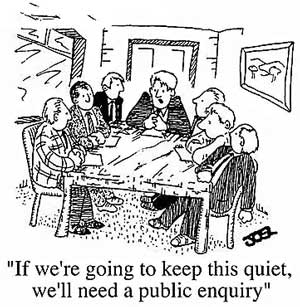Confidentiality
agreement
“Life
within
the Kremlin was shrouded in impenetrable secrecy.”
—Harrison Salisbury
“In a closed society where everybody's guilty, the
only crime is getting caught.
In a world of thieves, the only final sin
is stupidity.”
—Hunter S. Thompson

Boards need to do some of their work in without owners’
interference.
That is a given. However, how much secrecy is required? New members to
the board are often asked to sign a confidentiality agreement, (called a Code of Ethics). In some
condo corporations, it is a requirement.
These agreements are actually “loyalty oaths” so that board members are
required to put their loyalty to the board ahead of loyalty to the
owners.
It is claimed that the board needs to make its decisions in secret so
that the board members feel free to fully express themselves and to
prevent owners from becoming too disruptive. The by-laws may state that
any director who violates the code is automatically disbarred from the
board.
Here are three sections of the Canadian Condominium Institute’s (CCI)
form that some boards insist that all directors sign.
Director's
Code of Ethics Re: Condominium
I have consented to act as a Director of the Corporation
and I agree to comply with the following Directors’ Code of Ethics
throughout my terms as a Director:
Confidentiality–I will not
disclose to any person (including my spouse) information decided by the
Board to be confidential or privileged or which reasonably ought to be
deemed confidential. When in doubt, I will request determination by a
resolution of the Board.
Support–I will abide by decisions of the majority of the Directors even
though I may disagree, but I reserve the right to express my own views
to owners upon non-confidential issues.
Minimize Conflict–I
will attempt to prevent or minimize conflict and disruption and will
promote good relations amongst persons involved in our Condominium
Community. I will promote a first class image for our
Corporation, its units, owners and residents.
Here are my concerns with these three clauses.
Confidentiality
What if a majority on the board decided to do something that is
illegal under the Act or is unethical and demands that it should be kept secret?
For example the property manager and the majority on the board is
granting contracts to her live-in boyfriend. Who does the concerned
director report the board’s actions to?
How about when the president gets her apartment painted for free by a
contractor who gets a lot of work from the condo corporation? It
happens all the time.
Support
Go further than just disagree if it is a situation involving unethical conduct. Insist that your objections be
recorded in the meeting minutes and there be a recorded vote. Owners
have a right to examine these minutes. You can be sure that this will
not go over well.
Minimize Conflict
This broad statement can mean that you promise to remain silent and let
the Condo Nazis run all over you and the owners.
As an example the president of an Etobicoke condo was not paying his
maintenance fees. The property management company was not including his
unit on the monthly arrears reports.
Something minor but also unethical is when a director parks his car in
the visitor's parking area and does not get parking tickets but the
residents do.
I believe that these three provisions in the CCI ethics agreement are
harmful. It appears that they exist to protect the board from oversight
and to prevent transparency.
It does not mention reporting possible criminal activities, such as fraud or the acceptance of bribes or
benefits to the police or unethical, but not necessary criminal
practices, to the owners.
There is nothing in this Code of Ethics that
gives protection to, let alone encourages, whistle blowers.
top contents chapter previous next

